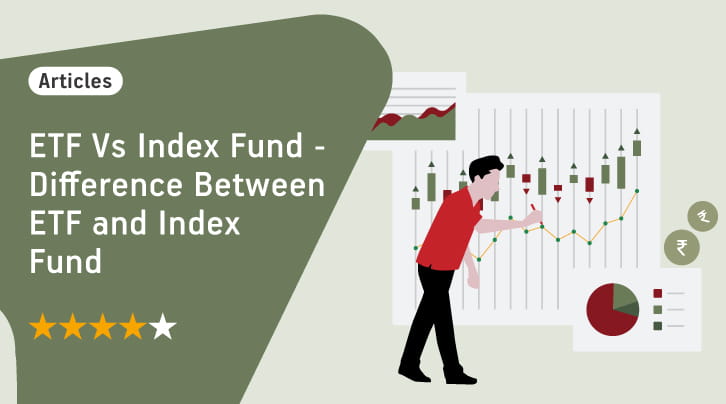Investing in passively managed funds has now become a wise norm rather than attempting to beat the market. Two passive investment vehicles that have shown their calibre in beating active funds include ETFs and index funds. But, it becomes difficult to side with one while comparing an ETF vs. index fund. So, scroll through this article to learn about their differences and pick the right investment avenue for you.
Index Fund
Index funds replicates different market benchmark indices like Sensex and Nifty 50. Investors make investments in securities, which can be further diversified into bonds, commodities, and shares.
Index funds ensure that no investment falls from the benchmark despite the market conditions.
Index funds can offer long-term wealth creation benefits. Therefore, it can be an extremely convenient passive investment avenue for investors.
Characteristics of Index Fund
If you are looking for an open-ended mutual fund, an index fund will come to your rescue. It enables you to invest and redeem according to your convenience.
Both growth and IDCW (formerly known as dividend) options are available with index funds. Therefore, you have the freedom to determine your risk appetite.
Fund managers will take care of your index funds and trade on your behalf.
ETFs
Exchange Traded Funds also focus on tracking benchmark indices like Sensex and Nifty. They try to deliver benchmark market returns. Once they are listed on the stock exchange, ETFs are traded like company shares.
Characteristics of ETFs
ETFs are associated with high trading costs and low expense ratios.
ETF investments are convenient and work exactly like share trading. Therefore, you will need a Demat account to invest in ETFs. The liquidity of the stock market influences ETFs.
Difference Between ETF vs. Index Fund
Let us consider the difference between ETF and index funds on the basis of certain factors.
Minimum Investment Amount
Minimum investment amount in ETFs is the price of one unit. You can buy one or multiple ETFs in the stock market.
The minimum investment amount for one time purchase for an Index Fund can be as low as Rs. 500. The detail is specified in the Scheme Information document (SID). You can invest in ETFs via SIPs. The minimum amount required is mentioned in SID.
Trading Fees
Both ETFs and index funds come with a low expense ratio. But the additional fees associated with these funds are different.
Usually, brokers don't charge a commission fee for ETF trades. Additionally, load fees, are also charged for index funds.
The annual expense ratio of an index fund will be lower than that of an ETF. But if you consider additional fees, index funds might be more expensive.
Tax Implications
ETFs are a tax-efficient alternative to mutual funds. You are required to pay capital gains taxes while selling the shares of an ETF or index fund. But as long as the holdings in your ETF portfolio are adjusted by managers, you don't need to pay any taxes.
Meanwhile, index funds need to buy and sell assets to match their portfolio to the underlying index. The value of capital gains taxes from any of these sales is not included in the fund portfolio NAV. It has an impact on the value of the index fund shares. But, since index fund holdings change rarely, it might not be a cause of concern.
Ending Note
Both ETFs and index funds are great methods of investing for your long-term goals. You should know that there's no clear winner in the debate of ETF vs. index fund. Consider your personal preferences to make the right investment.
Mutual Fund investments are subject to market risks, read all scheme related documents carefully.





 1800-270-7000
1800-270-7000




